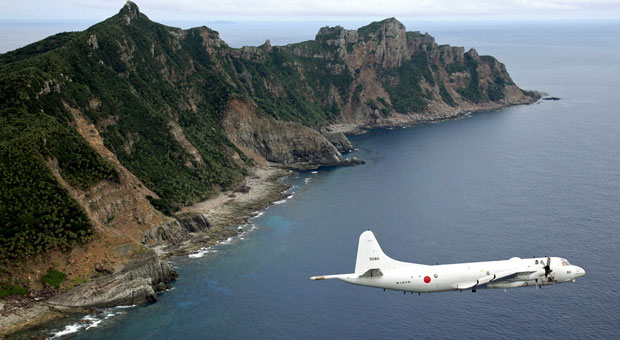Sense of destiny drives China aggression, says US

In this Oct. 13, 2011, file photo, Japan Maritime Self-Defense Force’s P-3C Orion surveillance plane flies over the disputed islands in the East China Sea, called the Senkaku in Japan and Diaoyu in China. The chief of US intelligence on Tuesday, Feb. 4, 2014, said China’s aggressive pursuit of territorial claims in the seas of East Asia was driven by a sense of historical destiny and was causing great concern among countries in the region. AP PHOTO/KYODO NEWS
WASHINGTON—The chief of US intelligence on Tuesday said China’s aggressive pursuit of territorial claims in the seas of East Asia was driven by a sense of historical destiny and was causing great concern among countries in the region.
Director of National Intelligence James Clapper said China had pursued a very impressive military modernization designed to address what it saw as America’s own military strengths.
Clapper was responding to a question on China’s recent actions in the East and South China Seas posed at a House intelligence committee hearing on worldwide threats.
The exchanges reflected deepening concern in Washington over Beijing’s assertive behavior and military modernization that challenges decades of American preeminence in the Asia-Pacific region.
The United States could potentially be drawn into a conflict should one break out between China and US treaty allies such as Japan and the Philippines.
‘Manifest destiny’
Clapper said China had been greatly concerned by the US “pivot” to Asia—the Obama administration’s attempt to boost America’s military, diplomatic and economic presence there—viewing it as an attempt at containment.
“They’ve been quite aggressive about asserting what they believe is their manifest destiny, if you will, in that part of the world,” Clapper told lawmakers.
He added that disputes over islands and energy resources, particularly in the South China Sea, created potential flash points for conflict.
Beijing denies any aggressive intent. It says its claims have a historical basis, including over most of the resource-rich South China Sea, where it has disputes with nations including Vietnam and the Philippines.
The top-ranking Democrat on the committee, Rep. C.A. “Dutch” Ruppersberger, described China’s November declaration of an air defense identification zone in the East China Sea—over uninhabited islands controlled by Japan but also claimed by China—as a “troubling power and land grab” and an affront to international law.
Air zone ‘unjustifiable’
Meanwhile, the top US diplomat for East Asia urged China not to declare a similar zone in airspace over the South China Sea.
Assistant Secretary of State Daniel Russel also said that China’s territorial claims must be based on international law, rather than sweeping declarations of jurisdiction.
“No one can justifiably, in compliance with international law, simply assert the right to exercise control over great swaths of the sea,” Russel told reporters.
“The region and the world wants to see that China’s intentions as it grows are to participate in and contribute to the international system as a country that respects international norms, respects the rights of others, and accepts that rules not coercion must, at the end of the day, guide behavior,” he added.
Clapper told lawmakers that China’s military modernization effort extended to all of its armed forces, in space and in cyberspace.
He predicted that over time, China would try to project its power globally.
Growing reach
Chinese state media reported on Tuesday a three-ship Chinese naval squadron had just concluded exercises in the Indian Ocean, showing off the growing reach of its seagoing forces.
Ruppersberger asked whether China could threaten US satellite systems, which have widespread military and civilian applications.
Clapper responded that there were countries pursuing very aggressive and impressive “counterspace” capabilities and that the United States was taking “appropriate actions” to deal with those potential threats.
Clapper did not elaborate on China’s military capabilities in space, which first grabbed international attention in 2007 when it shot down one of its own disabled satellites, causing a large amount of space debris.
RELATED STORIES
Aquino: China’s rulers like Hitler
China lashes out at US, Japan for ‘irresponsible remarks’ over ADIZ issue